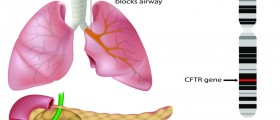
Chest congestion is a term that refers to accumulation of fluids and/or mucus in the lungs. The very condition features with cough, chest pain and breathing difficulties. Severe chest congestion can be easily heard during chest auscultation. The accumulated fluids and mucus produce specific sounds which are easily recognized by a well-experienced physician.
Chest congestion can be a consequence of a post nasal drip or it is associated with bronchitis and pneumonia. In post nasal drip the original location of excessive mucus formation are not the lungs but upper parts of the respiratory tract such as sinuses, throat etc. In this case the excess of mucus drips into the back of the throat and the infection may spread to the lungs causing additional production of mucus in the very lungs. In bronchitis and pneumonia the inflammation of the airways and the very lung tissue is accompanied by production of excess of mucus. This mucus is mostly sticky and initially it cannot be cough out of the lungs. Its presence leads to characteristic symptoms of chest congestion and breathing difficulties. Bronchitis can be caused by the cold virus or bacteria and pneumonia occurs due to bacterial, viral or even fungal infection.
Chest Congestion: Treatment
Patients suffering from symptoms such as cough, chest pain and breathing difficulties first undergo specific examination. Apart from the physical exam and chest auscultation a doctor performs chest X-ray to confirm chest congestion and find the underlying cause (bronchitis or pneumonia). It is essential to evaluate blood oxygen levels which are low in case of chest congestion. In case oxygen levels are rather low one must be hospitalized and if these levels are optimal the treatment will take place at home. The goal of the treatment for chest congestion is to enhance and ease coughing up the accumulated mucus. Cough expectorants are highly efficient since they thin out the mucus making it easier to be eliminated. Furthermore, patients may be prescribed bronchial dilatators. These medications lead to dilatation of the bronchial tubes and allow more air to enter the lungs.
Home Treatment for Chest Congestion
If patients are sent home after they have been examined and the illness confirmed they are prescribed specific medications (cough expectorants and/ or bronchial dilatators) and they are advised to return to the hospital if the symptoms become worse. These patients are supposed to hydrate their bodies properly. It is recommended for patients to drink plenty of water and other fluids which will assist in thinning out the mucus. Additional help can be obtained from a cool mist humidifier. And finally, breathing will be better if one is sleeping with his/her back propped up.















-And-Breathing-Problems_f_280x120.jpg)
Your thoughts on this
Loading...